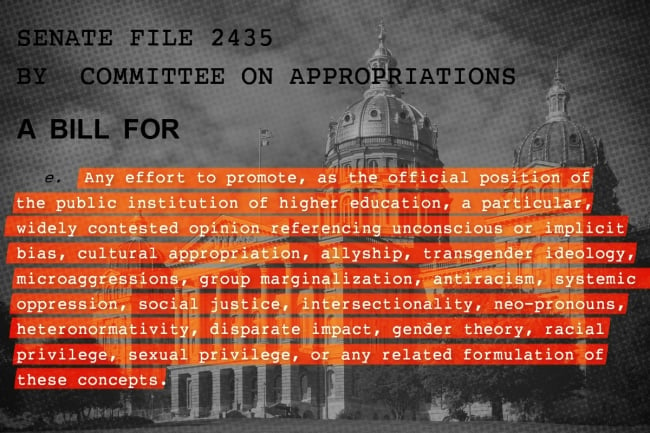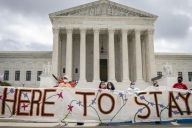You have /5 articles left.
Sign up for a free account or log in.

Senate File 2435 is awaiting Iowa Republican governor Kim Reynolds's signature or veto.
Photo illustration by Justin Morrison/Inside Higher Ed | Carol M. Highsmith/Library of Congress | Iowa Legislature
In November, Iowa’s Board of Regents adopted a broad diversity, equity and inclusion ban across its public universities: the University of Iowa, Iowa State University and the University of Northern Iowa.
The board’s first directive was sweeping: “Restructure the central, university-wide DEI offices to eliminate any DEI functions that are not necessary for compliance or accreditation.”
The orders didn’t stop there. Universities should “Review all college, department or unit-level DEI positions to determine whether DEI-specific job responsibilities are necessary for compliance, accreditation or student and employee support,” the board directed. It said any jobs “not necessary for these purposes shall be adjusted or eliminated.”
Iowa’s universities, and the board itself, are currently working to implement the directives. (Iowa State University, for instance, told the board Thursday that it will close its vice president for diversity, equity and inclusion’s office in July, while the University of Iowa said its position reviews will be done by the end of 2024.)
But the regents’ action didn’t go far enough for Republicans in the Iowa General Assembly. On April 9, they introduced an education-funding bill. Within 10 days, they had added anti-DEI provisions and passed the bill along to the Republican governor, Kim Reynolds, the day before this year’s legislative session ended. Her office didn’t respond to a request for comment from Inside Higher Ed on whether she plans to sign or veto the measure; Reynolds has 30 days from the April 20 adjournment to decide.
Adam Zabner, a Democratic state representative, said that while an extensive anti-DEI bill failed in the state Senate after passing the House earlier in the session, the anti-DEI provisions have now found their way into what “should be a routine budget bill.” Jeremy C. Young, director of the Freedom to Learn program at PEN America, a free expression group that opposes DEI bans, said the provisions were slipped “into the budget at the last minute.” Republican lawmakers didn’t respond to Inside Higher Ed's requests for comment Thursday.
If signed into law, Senate File 2435 would ban Iowa’s public universities from having DEI offices or from hiring or assigning anyone “to perform duties” of a DEI office. The ban would be sweeping because of how the bill defines DEI offices and DEI itself; it goes beyond the directives of the Board of Regents, which had left the definition of DEI open to interpretation.
In the legislation, DEI offices are any university unit responsible for “promoting … activities or procedures related to” DEI, and DEI encompasses any “activities designed or implemented with reference to race, color, ethnicity, gender identity or sexual orientation.” Unlike in some other states’ anti-DEI laws, these broad definitions would restrict programming beyond the university’s central DEI office, and would restrict programming that only references identities such as race and gender.
The regents’ directives had left room for DEI to continue—to some extent—outside of universities’ central DEI offices.
The bill also includes a version of what’s known as an institutional neutrality requirement. The war in Gaza revved up a pre-existing debate about whether university administrations—or subsets, such as academic departments—should take public stands on controversial political issues. But Senate File 2435 would require Iowa’s public universities to stay neutral on a potpourri of ideas or phrases that conservatives have contested.
It would forbid “any effort to promote,” as a public university’s official position, “a particular, widely contested opinion referencing unconscious or implicit bias, cultural appropriation, allyship, transgender ideology, microaggressions, group marginalization, antiracism, systemic oppression, social justice, intersectionality, neo-pronouns, heteronormativity, disparate impact, gender theory, racial privilege, sexual privilege, or any related formulation of these concepts.”
“This could, in a maximal interpretation, ban the university from stating any idea," Young said. In his view, the bill contains “the most vague, most overreaching version possible of a neutrality requirement around DEI-related concepts,” he said.
Young said Iowa legislators “are passing language that is so breathtakingly broad” that it risks “banning any program,” subject only to the state’s enforcement decisions. Young did, however, say the bill would “not have direct effects on faculty or student speech,” unlike new laws in Alabama and Indiana.
Alongside exemptions for complying with federal and accreditation requirements, the bill includes carve-outs saying its ban on DEI offices and functions wouldn’t impact academic departments that exist primarily for offering courses for credit. Registered student organizations would also be exempt.
Tyler Coward, lead counsel for government affairs at the Foundation for Individual Rights and Expression (FIRE), another free speech group, said the bill doesn’t cross “FIRE’s bright line” of restricting students’ and faculty members’ free speech or academic freedom. Coward said he reads the bill as circumscribing the official policies and procedures “of the institution itself,” not the faculty members or students within it.
“FIRE does recognize that DEI offices have been responsible for enforcing campus orthodoxy on certain issues” and for “investigating and punishing protected expression on campus,” Coward said. He also said “we’re generally skeptical of administrative bloat at institutions—administrative bloat, writ large, has a negative effect on free expression.”
Young, however, said it “defies belief” that the legislature could “pass this kind of extreme censorship” on institutional leaders and staff without affecting faculty and students downstream. University administrations ultimately uphold academic freedom, he said, and “what is done in this bill, it will take away the support structure that makes academic freedom possible.”
A spokesperson for the University of Iowa wrote in an email that the “university does not comment on proposed or recently adopted legislation, not yet signed into law.” Iowa State University did not respond to a request for comment, referring Inside Higher Ed to the board's spokesperson.
Zabner said his district includes most of the University of Iowa. “Even when there are exceptions in the letter of the law, you’re putting a lot of pressure on teachers, and imagine you’re a teacher or professor and you’re worried you could be sued."
“This type of policy does not belong in a budget bill,” Zabner said. He thinks lawmakers should have focused on freezing tuition for students rather than “some national culture war." As for the bill, he said “just the coverage and the conversation will create a chilling effect, and that’s a shame.”








